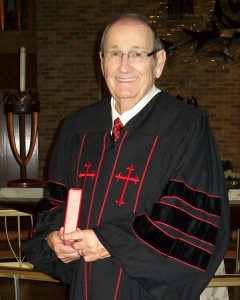
I visited a friend recently, Dr. Peter Forest, who lives on the Texas side of Toledo Bend( next door to my sons’ camp). Dr. Forest, 79, is a nice enigma. He’s retired from doctoring, but he’s not retired from the computer, where he types daily. There are stacks and stacks of paper with his personal musings, prose, poetry in every corner of his room. He has traveled widely and has relics and rare specimens of antiquity. I asked him about having his thoughts published, but he says he’s writing his feelings, to understand life and his place in the world. Before I left, he pulled a piece of paper from his computer and said, “Here, right off the press, my latest effort.” The following is a small part of it:
–
–
–
“What can I learn from these through which I came to life?
Each has potholes in their ancestry and this challenges their connection to the love of God…
We all fall short of the true path to God-ness,
No one is excluded.
My purpose is to pray and help others, to walk and learn my path
As it has been designed by my Father/ Mother Creator.
May I refrain from a negative tongue and from judgment of others.
May I be quick to nurture with encouragement.”
I find this rather profound, and one phrase that stood out to me was: “potholes in our ancestry”. One has to wonder what he found. All of us have “potholes” in our life—things we’re not proud of; things we’d like to forget. Billy Graham confessed that he fights a few demons of his own. Perhaps demons are pretty common. I tried the genealogy thing one day and when I came to the first pothole, I quit looking. Has human nature changed very much? I doubt it.
Fast forward to another visit I had just days ago with Dr. Chris Andrews, who was pastor of the FUMC Baton Rouge for over 20 years and is now a “Jubilee Pioneer”. He handed me his latest column. “The cheapest thing going,” said Chris, “is human life. Killing is commonplace in our world.” He refers to the 71st Anniversary of the liberation of Auschwitz, where over a million Jews died. How could the Holocaust happen in a modern nation that has produced such great art and music, brilliant scientists and theologians among its population and was admired for its cultural sophistication? How could they have allowed such a horrible thing like the Holocaust? And yet, it happened.
It’s easy to go numb before the constant wasting of life. Somehow, we get used to it; accept violence as inevitable and go about the day as though nothing is unusual. The greatest gift we have is life. We don’t know exactly what’s on the other side, but we do know that life on earth—however difficult—is an experience of love and laughter, tears and compassion, joy and joining, sadness and separation. Only the living can experience God incarnating Himself. Jesus grew into a man who was the salt in the wound of mankind, and the light that reveals our brokenness. It is Jesus who exposes us to ourselves so that we can avoid the “potholes” in life. It is Jesus who can make us into new creations and give us the power to reach out to the poor and to the countless victims of hatred. Of course, we can do most of this without Jesus, but He inspires us and motivates us to overcome our selfish ways and become a more loving and kind individual.
What kind of legacy will you leave your children and grandchildren? A hundred years from now, what will people discover in your ancestry? The important thing is not so much your family tree, as it is the kind of life you are living today.
In Miami Beach, Florida, stands a four-story high sculpture of an arm reaching upward, surrounded by over 100 sculpted figures, emaciated and downtrodden, representing the six million Jewish lives lost in the Holocaust. It also features a Memorial Wall with the names of lost loved one carved into it; and several other monuments one inscribed with Anne Frank’s now-famous lines: “Then in spite of everything I still believe that people are really good at heart.”
Chris makes this suggestion: “Try looking at every face as the face of God. Practice doing this for a couple of days. Believe that when you look at another person, you are really looking at an expression of God’s own self. We are extensions of God’s spirit. The Bible teaches that God has created us in God’s own image (Genesis 1:27). If that’s the case, each of us is a reflection of the Divine. Would you raise your hand against God? Is that not exactly what occurs in every act of violence done by humans against humans?”
Is all of this wishful thinking? Perhaps. But try it at least one day. See the other person as the face of God. The person who checks you out at the grocery, your co-workers, spouse, children, etc. Every journey begins with a single step. We can eliminate one “pothole” at a time. It all starts with one person, someone like you. Amen.









